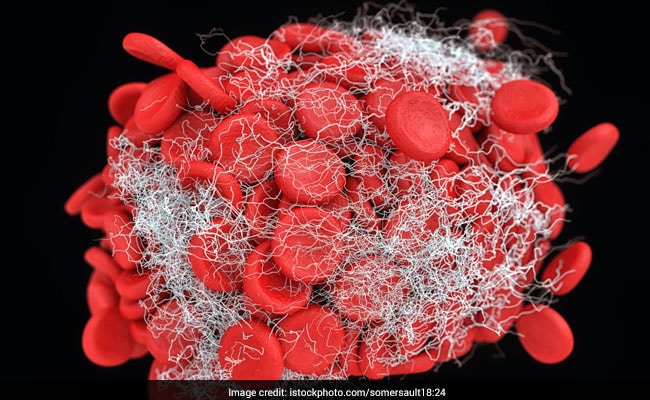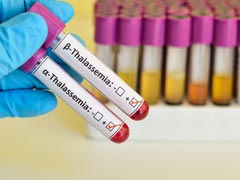People with thalassemia produce less healthy haemoglobin proteins and their bone marrow produces fewer healthy red blood cells. Here are some common myths around thalassemia you should stop believing.

Thalassemia: People with thalassemia produce less healthy haemoglobin proteins
HIGHLIGHTS
- Thalassemia can lead to symptoms like pale skin and weakness
- There are several complications linked with thalassemia if left untreated
- Thalassemia is a common inherited genetic blood disorder
Thalassemia is a common inherited genetic blood disorder that affects the body's ability to produce normal haemoglobin. People with thalassemia produce less healthy haemoglobin proteins and their bone marrow produces fewer healthy red blood cells. In India about 10,000 children are born every year with thalassemia.
There are different types of thalassemia and the type of thalassemia a person may have depends upon the number of defective genes they have inherited. There are mainly 2 types of thalassemia:
- Beta-thalassemia - Major and Minor Subtype
- Alpha thalassemia - haemoglobin H and fetal hydrops subtypes
Thalassemia Major is found in children who receive mutated genes from their parents. Inherited child will be unable to produce the necessary haemoglobin, which eventually leads to chronic fatigue. People with thalassemia trait in one gene are Thalassemia Minor. The confirmation of Thalassemia Minor can happen through a specific blood test known as haemoglobin electrophoresis.
In transfusion-dependent beta thalassemia symptoms begin after a baby is few months old. In others it can take few years. The symptoms can include:
- Pale skin
- Acting cranky or upset
- Not growing as much as expected
- Swelling of the belly
- White part of the eyes turning yellow
- Facial bone or skull being wider than usual
- Dark urine
- Weakness
- Fatigue
Complications of Thalassemia:
Iron overload: Patients suffering from thalassemia can accumulate too much iron content in their bodies, either from the disease or from frequent blood transfusions. Excess iron may result in damage to the heart, liver and endocrine system.
Infection: There are high chances of an increased risk of infection in thalasemmics particularly if the spleen is removed.
Heart related issues: Associated with severe thalassemia are congestive heart failure and abnormal heart rhythms in patients.
Treatment option includes blood transfusion and iron chelation versus transplantation for patients suffering from thalassemia. With a mild case, one might feel tired and not require treatment. But for serious cases regular blood transfusions are required. How often one needs transfusions may vary from person to person.
1. Transfusion and chelation therapy
Regular transfusion and chelation therapy have helped in improving survival and quality of life of patients with thalassemia and have shifted a previously fatal disease with early death to chronic disease that is compatible with prolonged survival. For effectiveness, treatment should start as early as the first few months after birth and should continue for life or until the patient undergoes transplantation.
2. Allogeneic hematopoietic stem cell transplantation (HSCT)
The realistic and clinically rationale curative modality available to treat thalassemia major is Allogeneic stem cell transplantation. Recent developments have advanced the technique from both siblings and alternate donors other than fully matched siblings with different intensities of conditioning and graft engineering for global use.
There are multiple advantages of stem cell transplantation which includes
- High cure rate with the current advances in transplant engineering and conditioning regimens.
- Lower cost and cost-effectiveness
- Improved impact on Quality of Life for both patients and families
Here are the myths that are important to be busted
Myth: Thalassemia carriers should not get married
Fact: People with thalassemia can get married to anyone. The couples must get their DNA testing done to see which mutation they have. However, if a thalassemia carrier marries a carrier, then at the time of 8-10 weeks of pregnancy, the expecting mother should go for antenatal diagnosis of thalassemia.
Myth: If two thalassemia carriers marry each other, they will have a thalassemia major child
Fact: One can also go for the pre-implantation genetic testing to select the embryo that does not have the thalassemia gene along with a check for aneuploidy. This would ensure a non-thalassemia major birth despite both being thalassemia carriers.
Myth: There is no treatment for thalassemia major
Fact: If a thalassemia child is transfused with a quality filtered blood regularly, the process can help the patient to get through to adulthood. Also, one must look at levels of ferritin for iron overload and oral iron chelation agent. Ensure checking for early organ damage by performing MRI of the heart, pancreas and liver to get the best results for a proper growth. The other options available for treatment are bone marrow transplant and gene therapy.
Thalassemia major patients should be offered a transplantation before they develop end organ damage and iron overload related complications; the earlier the better. Thalassemia is certainly a dangerous disease, if detected at an early stage can be managed successfully with the help of timely preventive health check-up.
(Dr. Suraj Chiraniya, Hemato Oncology and BMT, HCG Cancer Centre Mumbai)
Disclaimer: The opinions expressed within this article are the personal opinions of the author. NDTV is not responsible for the accuracy, completeness, suitability, or validity of any information on this article. All information is provided on an as-is basis. The information, facts or opinions appearing in the article do not reflect the views of NDTV and NDTV does not assume any responsibility or liability for the same.
DoctorNDTV is the one stop site for all your health needs providing the most credible health information, health news and tips with expert advice on healthy living, diet plans, informative videos etc. You can get the most relevant and accurate info you need about health problems like diabetes, cancer, pregnancy, HIV and AIDS, weight loss and many other lifestyle diseases. We have a panel of over 350 experts who help us develop content by giving their valuable inputs and bringing to us the latest in the world of healthcare.














